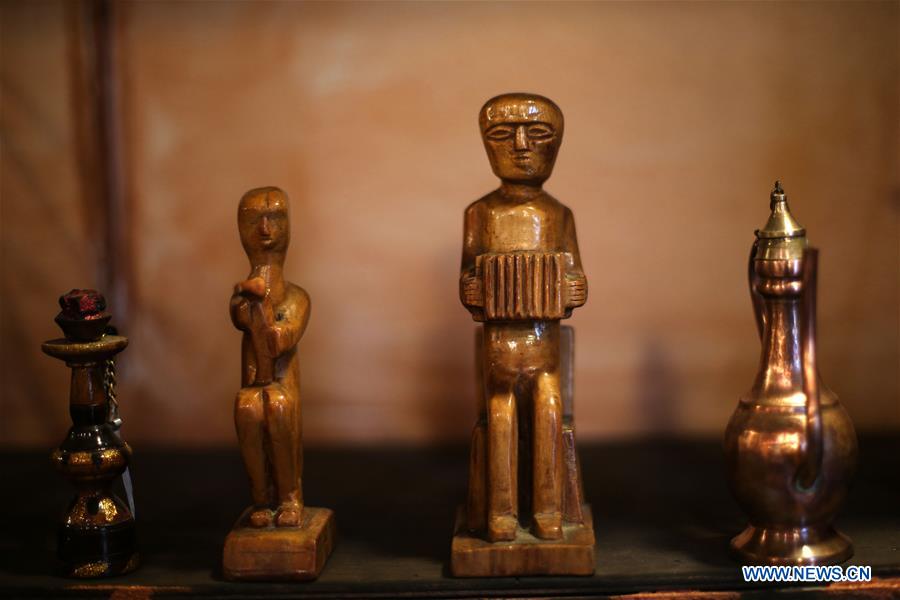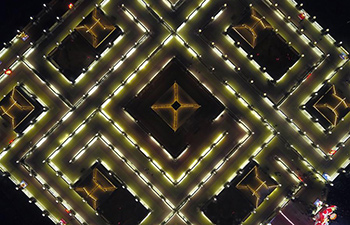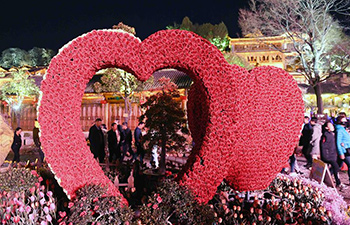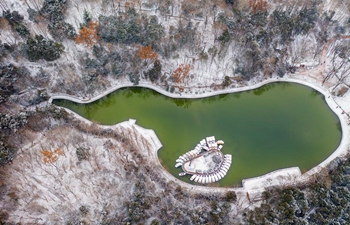Antique pieces are seen inside the house of Palestinian man Fadel Musabehin in Gaza City, on Feb. 9, 2019. A Palestinian man from the Gaza Strip turns his house into a museum of antiquities showcasing more than 1,000 artifacts that he spent almost 30 years to collect in an attempt to preserve the Palestinian heritage and identity. Fadel Musabeh, in his 50s, has a variety of archaeological and heritage ancient artifacts, including copper, ivory and pottery pieces. (Xinhua/Stringer)
GAZA, Feb. 13 (Xinhua) -- A Palestinian man from the Gaza Strip turns his house into a museum of antiquities showcasing more than 1,000 artifacts that he spent almost 30 years to collect in an attempt to preserve the Palestinian heritage and identity.
Fadel Musabeh, in his 50s, has a variety of archaeological and heritage ancient artifacts, including copper, ivory and pottery pieces.
Musabeh, who works for the Palestinian Authority, spent the last three decades collecting and preserving ancient Palestinian antiquities and ancient relics.
The man opens his house for visitors on daily basis for free, noting that he is keen to contribute to raising awareness about the protection of ancient antiquities as well as giving the new generations an idea about their heritage.
Finding all these pieces was not an easy work for Musabeh who spent big efforts and money to make his dream of having a museum a reality.
"I found some of the pieces buried under the dirt, while I bought others from popular markets," Musabeh told Xinhua as he dusted off copper dishes displayed at his home in Gaza city.
He noted that his 15 sons often helped him to collect antiques, "which reflects that the message to spread awareness about heritage is making success."
The man explained that a number of his friends and neighbors provided him with some copper and ivory pieces.
In the Gaza Strip, caring for antiquities is not common amid the high poverty and unemployment rates suffered by the two million residents of the seaside territory which has been placed under a tight Israeli blockade since Islamic Hamas movement seized power there in 2007.
Israel also launched three wars on the Gaza Strip in the past years, causing the destruction of thousands of homes and massive infrastructure losses.
Musabeh himself had his home completely destroyed during the 2014 Israeli war on Gaza when Israeli tanks heavily bombed the densely populated neighborhood of Shujaiya in eastern Gaza.
At the time, Musabeh had taken precautionary measures immediately after the start of the war and evacuated his family and antiquities to another safer house owned by his family.
Despite his interest in collecting antiquities, Musabeh's lack of experience has caused damage to some of the pieces when he tried to qualify them for display.
The oldest artifact that Musabeh owns dates back to about 200 years ago, with about 700 copper pieces of small figurines of old animals and dishes that date back to 150 and 200 years ago. In addition, the man has original ivory pieces dating back to more than 150 years ago.
"The collection that I have deals with all aspects of the ancient heritage life of the Gaza Strip, including pieces that mimic the folklore such as copper coffee grinders, coffee jugs and scales," he said.
The Gaza Strip is rich in ancient antiquities and boasts of significant archaeological sites. Some of these ancient findings date back to bronze and byzantine eras and others go back to the Stone Age.
The location of the enclave at the crossroads of Africa, Asia, and Europe made it the passageway for many human civilizations that left huge fortune behind.
In the whole Gaza Strip, there are only five registered museums showcasing thousands of pieces that represent various civilizations.
At least 184 archaeological sites have been discovered in the territory, but archaeologists believed that there were others underneath.
However, many of the artifacts found by people are sold illegally outside Gaza.
Despite his modest income, Musabeh refused repeated requests to sell pieces of antiques that he owns.
He is seeking a license from the Ministry of Tourism and Antiquities in Gaza to keep the artifacts in his small museum to be documented in official records of the ministry.
"I look forward to receiving financial support that will enable me to expand my museum and turn it into a tourist attraction," he said.??

















